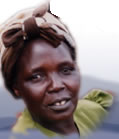THEMES IN THIS
TESTIMONY
Culture and Customs

Education

Family Life

Gender

Health

Click on arrows
to find more
testimonies
featuring
these themes
|
|
Sex
|
Female
|
|
|
Age
|
36
|
|
|
Identity
|
Sabaot
|
|
|
Occupation
|
Teacher
|
|
|
Location
|
Kapsokwony
|
|
|
Date
|
November 1996
|
|
summary
An intelligent and responsive narrator who was the first female teacher in adult education in Mount Elgon. Education is the key topic and is well covered, particularly adult education, which doesn’t generally feature in other testimonies. Changes in women’s roles and aspirations is also informatively discussed. However the interview covers a disappointingly narrow range and one is left with the feeling that a great deal more could have been produced had the interviewer ventured into other areas. Nevertheless, this testimony is interesting and useful on the two topics of education and women, and draws attention to shifting perspectives in relation to these.
Jane highlights an interesting paradox in Sabaot society. Whilst talking extensively about how people now value the importance of education for both sexes - “People have now realised that if a girl receives quality education, she can also get a good job… If a daughter is married, she will still help her parents, unlike the son” – she still sees the persisting trend, particularly in poor families, of valuing a boy over a girl: “Most Sabaot families look at the son as the cornerstone of the family.” Despite this, the narrator stresses the weight the Sabaot now place on education, and consequently how many people (in particular women) have joined her adult literacy classes. It seems that adult education was originally held in slight contempt, even the narrator was initially reluctant to teach these classes. But it has proved successful and has had an impact in reducing inequalities.
The changing attitudes to education, as well as education’s impact on the community, seem to have been paralleled as well as linked to similar changes to women’s roles and expectations. But again, despite the changes, the narrator sees some things as enduring: “Even if I earn my salary, I have to respect my husband just like any Sabaot woman.”
detailed breakdown
|
You will need a password from Panos to view the full
transcript of the interview. To apply for a password, click here.
Once you have a password, click here to go to the beginning
of the transcript. You can also click on any section of the
breakdown of content below and go straight to the
corresponding part of the transcript.
|
| Section 1-2 |
Educational and early employment history. Cultural difficulties she faced: “In the Sabaot culture, an unmarried lady is not allowed to mix freely with old men and women. I had to be taken to the interview for adult education teachers by my father…” Describes how she initially felt dissatisfied with her job and only applied because her father told her to. Adult literacy classes promoted by government. Difficulties at beginning due to cultural unease over mixing pupils according to sex and age.
|
| Section 2-3 |
Describes how may of her colleagues became discouraged due to lack of motivation from the government.
|
| Section 3-4 |
Techniques used in adult education and initial disbelief in its potential. Gradual change in attitudes due the success of some participants.
|
| Section 4 |
Reasons for better performance by women: women are faster learners; competitiveness between co-wives; and involvement of women in buying and selling. Also higher enrolment reflects the greater number of illiterate women due to past preference for educating boys.
|
| Section 5 |
Discusses prejudice against educating girls (it was felt they would not become good wives and would be promiscuous) and how now people have realised the benefits of educating girls. Older women have also realised the benefits of education and are therefore joining adult classes. In addition, changes in the local economy have made education even more imperative.
|
| Section 6 |
Gender roles: “He does the planning and you do the implementation…The roles of a woman have changed, especially for the elite women, for they can plan for the family just like the husband. The roles are always the same for men.” Women must still “respect” their husbands, though their roles are changing due to greater autonomy from the extended family and husbands increasingly working away. “These days, family members do not interfere just because the husband is away. In the past a woman belonged to the whole clan.”
|
| Section 7 |
Changed family life: “…in the past, there was a lot of cooperation… a wife belonged to a clan so she could get assistance from many sources. People then were very close. There were more family ties than now. Presently, a family comprises of a father, mother and the children.”
Feels that growing up in a polygamous family was good but that it imposes difficulties on the parents, especially when the man grows old and has to look after and educate young children. As a woman she is personally opposed to polygamy, but she sees some of its advantages.
|
| Section 7-8 |
Difficulties faced by Sabaot single mothers; lack of respect from society, even if the woman in question is well educated.
|
| Section 8 |
Believes that the tendency to give priority to educating boys persists, especially in less well-off families.
|
| Section 8-9 |
Role of circumcision in teaching girls how to behave as a woman/wife.
Decline in female circumcision due to influence of the Church and outsiders, and due to increased rejection of the traditional belief that an uncircumcised woman cannot bear children. Narrator’s belief that circumcision doesn’t affect a girl’s formal education.
|
|


